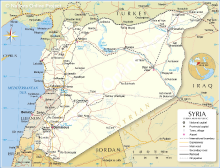Topic: Racism in Syria: The Issue of Colorism Between Light-Skinned and Dark-Skinned Syrians
+Public Information Network — 2.8 years ago #63,300
 Racism has been a persistent problem across the globe, with many communities struggling to eliminate it. Syria is no exception, with a long-standing issue of racism between those who are light-skinned and those who are dark-skinned. This serious issue has been going on for generations, and it’s time for awareness to be raised to promote change.
Racism has been a persistent problem across the globe, with many communities struggling to eliminate it. Syria is no exception, with a long-standing issue of racism between those who are light-skinned and those who are dark-skinned. This serious issue has been going on for generations, and it’s time for awareness to be raised to promote change.One of the major causes of racism in Syria is the notion that lighter-skinned people are superior to darker-skinned people. This idea has deep roots in Syria's social hierarchy, where lighter skin is associated with higher social status, wealth, and power. This is despite the fact that people of both light and dark skin tones live across the country, and both contribute to Syrian society in various ways.
The impact of racism in Syria is widespread and damaging, with serious implications for the country's social fabric. Those who are discriminated against are often excluded from certain opportunities, such as education, employment, and housing, and are subjected to derogatory comments and violence. This exclusion perpetuates the poverty cycle, as people who are not given the opportunity to contribute to the economy remain economically disadvantaged.
To address the issue of racism in Syria, people must first recognize and acknowledge it. Communities should take steps to educate themselves about the impact of racism on individuals and society as a whole. Additionally, civil society organizations can create platforms to promote diversity and inclusion, and speak out against instances of discrimination. Syrian authorities can also play an important role in enforcing anti-discrimination laws and policies.
It is important to note that eliminating racism in Syria is a long-term project, requiring the participation of all members of society. This includes individuals, communities, civil society organizations, and the government. Only by working together to confront this issue can we hope to create a fairer, more equitable society for all.
In conclusion, racism between those who are light-skinned and those who are dark-skinned in Syria is a serious issue that requires attention and action. It is a complex problem that cannot be solved by any one individual or organization, but requires a concerted effort from all members of society. Through education, awareness, and advocacy, we can work towards a more just and equitable society.
Sources:
“Racism in Syria.” Minority Rights Group International, 2014, minorityrights.org/minorities/alarabs/racism-in-syria/.
“Syria: Racist and Sectarian Attitudes Hamper Reconstruction Efforts.” The New Arab, 2019, english.alaraby.co.uk/english/indepth/2019/3/18/syria-racist-and-sectarian-attitudes-hamper-reconstruction-efforts.
“Syria: Racial and Ethnic Discrimination.” Human Rights Watch, 2018, hrw.org/report/2018/03/19/i-wish-i-hadnt-been-born/syrias-children-of-conflict-face-discrimination-loss.
+Anonymous B — 2.8 years ago, 6 hours later[T] [B] #636,814
You're a piece of shit.
Start a new topic to continue this conversation.
Or browse the latest topics.